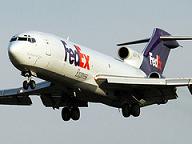FedEx today announced a sharp drop in first-quarter profits on slowing volumes and soaring fuelcosts and unveiled a 4.9% net hike in express prices for US customers next January even though it
expects no short-term improvement in the US economy and a continued slowdown in the globaleconomy.“Global economic conditions are challenging, but FedEx is taking strong, proactive actions tomanage through this difficult cycle,” chairman and CEO Fred Smith said in a statement. “We arecommitted to implementing strategies that will enhance the customer experience, gain market share,reduce expenses, improve profits and ensure the long-term success of the company.”
CFO Alan Graf told analysts in a conference call that FedEx expected no improvement in the USeconomy in the near-term and a continued slowdown in global economy. Current savings measuresincluded “severely curtailing” incentives, not replacing staff unless “absolutely necessary”, andfewer flights in order to save fuel. The company, which has cut its capital spending budget for thefiscal year by $400 million to €2.6 billion, would focus investment on the international networkand the US Ground and Freight businesses, he added.
In the first quarter ending August 31, FedEx saw its operating profit drop 23% to $630 millionon revenues up 8% at $9.97 billion. Fuel costs were up 66% on the same quarter last year. Theoperating margin dropped by 2.5 percentage points to 6.3%. Net profits dropped 22% to $384million.
Total combined average daily package volume in the FedEx Express and FedEx Ground segments grew1% year over year for the quarter. Growth in ground, FedEx SmartPost® and international domesticexpress shipments was substantially offset by a continued decline in U.S. domestic expressshipments, the company noted.
FedEx Express increased Q1 revenues by 9% to $6.42 billion but costs rose 13%, driven by a 65%jump in fuel costs. Its operating profit dropped 34% to $345 million, leaving the operating margindown 3.4 percentage points at 5.4%.
Express results were impacted by global economic weakness, higher fuel prices and the relatednegative effects of higher fuel surcharges, and one fewer operating day, FedEx said. These factorsmore than offset the benefits of aggressive cost containment activities, including volume-relatedreductions in flight hours, labour hours, fuel consumption and maintenance costs and decreases invariable incentive compensation.
In the USA, domestic package volumes dropped 5% as customers downtraded from air to groundtransportation, but revenue per package increased 13% due to higher fuel surcharges.
FedEx Express will increase prices for US domestic and export shipments by a net 4.9% effectiveJanuary 5, 2009. This comprises an average 6.9% rate increase, partially offset by adjusting thefuel price at which the fuel surcharge begins, reducing the fuel surcharge by two percentagepoints. About 75% of customers would be affected in January by the price rise, and the remainderlater in the year depending on contractual terms, officials said.
FedEx Express continued to grow its overall international business in the first quarter.International Priority (IP) package revenue grew 12%, driven by 14% growth in revenue per packageprimarily due to higher fuel surcharges and favourable exchange rates. Package volumes were flatbut freight volumes grew 14% in weight terms. International domestic package volumes were up 10%but the yield was flat.
Discussing world regions, CEO Fred Smith told analysts that Europe had slowed but Asia was stillgrowing due to China, although at lower rate than previously. CFO Alan Graf noted that majorelectronics customers were shipping less from China to the USA due to weaker US import demand.FedEx Express expected flat or slightly lower IP volumes in the next quarters as customersdowntraded to deferred products, he added.
FedEx Express Dave Bronczek commented that FedEx was increasing air capacity in some areas suchas Europe-US East Coast, Mexico, Canada and Vietnam. The China domestic express business had “verynice” volume growth, although not quite as good as hoped for due to four fewer working days and theimpact of restrictions surrounding the Olympic Games.
The US domestic deferred parcel business, FedEx Ground, increased revenue 9% to $1.76 billionand improved its operating profit by 3% to $196 million. This left it with an operating margin of11.1%, down from 11.7% the previous year. Average daily ground package volume grew 4% year overyear in the first quarter, primarily due to the continued growth of the FedEx Home Delivery®service. Yield improved 6% primarily due to fuel surcharges. FedEx SmartPost revenue increased 14%,while average daily volume grew 9%.
Looking ahead, FedEx said it expected earnings to be $1.40 to $1.60 per diluted share in thesecond quarter compared to $1.54 a year ago. For the full year, the company reaffirmed its earningsestimate of $4.75 to $5.25 per diluted share, reflecting weaker global macroeconomicconditions.












